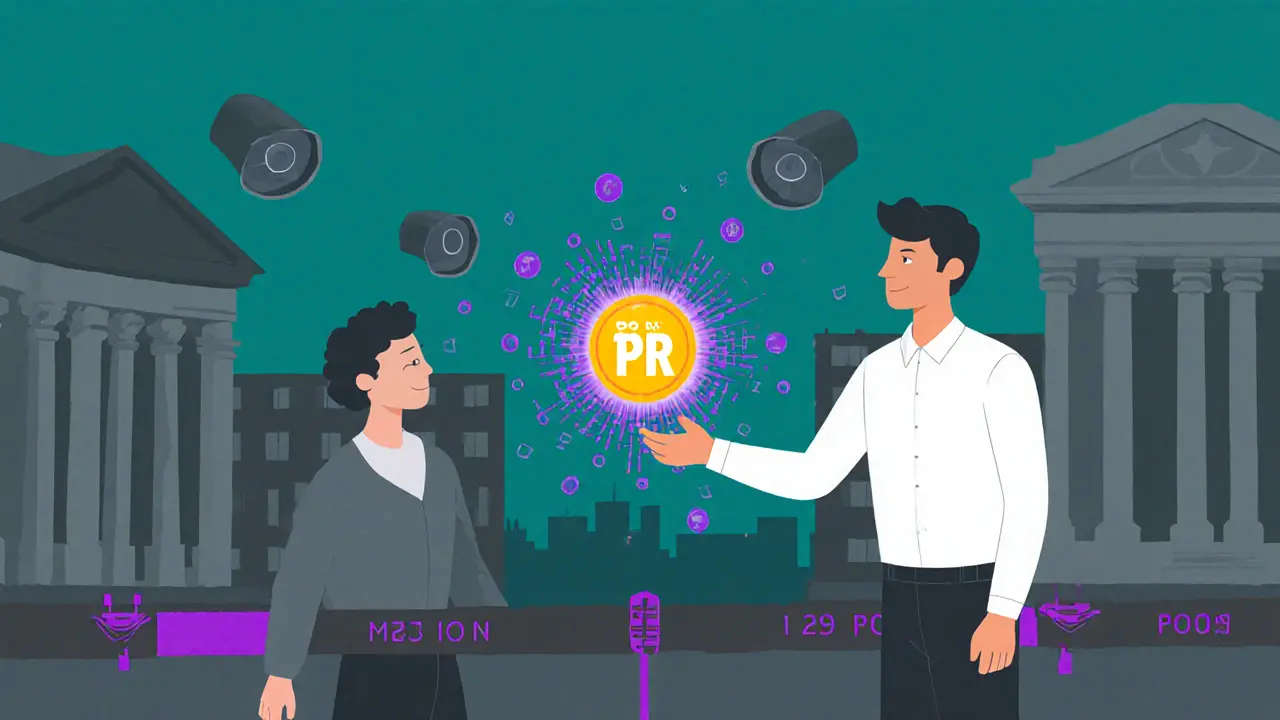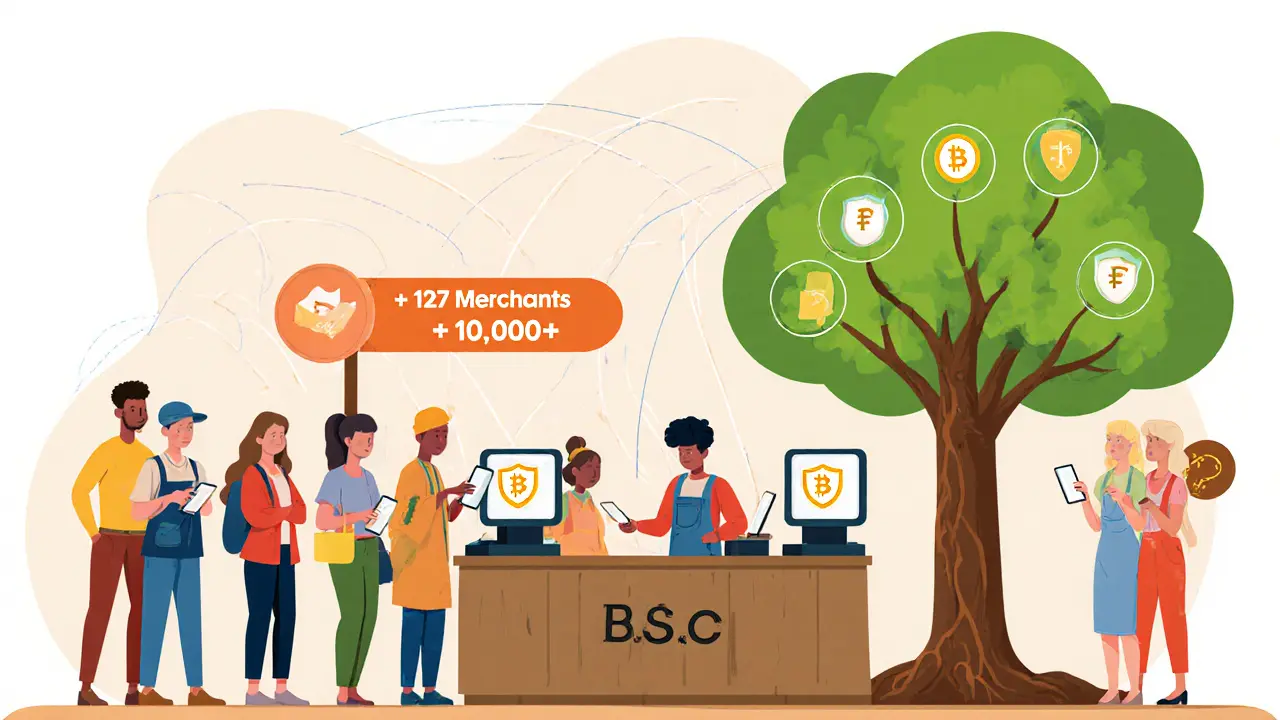What is PRIVATEUM GLOBAL (PRI) Crypto Coin? Privacy, Tech, and Real-World Use
 Jun, 21 2025
Jun, 21 2025
Privacy Coin Transaction Cost Calculator
Privacy Coin Transaction Cost Calculator
Compare transaction costs and speeds for different privacy-focused cryptocurrencies. See how PRIVATEUM GLOBAL (PRI) compares to alternatives for your cross-border payments.
PRIVATEUM GLOBAL (PRI) isn’t another memecoin or copycat token. It’s a privacy-focused cryptocurrency built on Binance Smart Chain (BSC), designed to let users send money without exposing their transaction history - and without relying on banks or governments. But does it actually deliver on that promise? And is it more than just another speculative bet in a crowded crypto market?
What PRIVATEUM GLOBAL Actually Does
PRIVATEUM GLOBAL (PRI) is a BEP-20 token that runs on the Binance Smart Chain. Unlike Bitcoin or Ethereum, which record every transaction publicly, PRI uses advanced encryption and zero-knowledge proofs to hide sender, receiver, and amount details. That’s the core idea: financial privacy. You send PRI to someone, and no one else on the blockchain can see who you sent it to, how much, or when.
The project’s founders claim PRI is meant to empower people in a world where financial institutions control access to money. Their website says it’s built for “transparent, user-first digital finance across Europe and beyond.” That’s not marketing fluff - it’s a direct response to rising bank surveillance, cross-border payment fees, and government tracking of digital transactions.
It’s not trying to replace Bitcoin. It’s trying to replace the bank transfer.
How PRI Works Under the Hood
PRIVATEUM GLOBAL doesn’t reinvent the blockchain. It builds on BSC, which means:
- Transactions confirm in about 3 seconds - much faster than Monero’s 2-minute blocks.
- Fees are under $0.10 per transaction, compared to $1-$50 on Ethereum during peak times.
- It works with any wallet that supports BEP-20 tokens: Trust Wallet, MetaMask (with BSC added), Ledger, Trezor.
The privacy layer is where PRI claims to stand out. It uses zero-knowledge proofs - the same math that powers Zcash - but applied on a faster, cheaper chain. That means you can choose to make a transaction private, without slowing down the whole network. Unlike Monero, where privacy is mandatory for every transaction, PRI makes it optional. You can send publicly if you want to. That’s a design choice - and it’s controversial.
Why? Because optional privacy means less anonymity. If half your transactions are public, someone could still trace your activity over time. Monero’s mandatory privacy makes that nearly impossible.
Market Stats: Is PRI Gaining Traction?
As of November 2023:
- Price: Around $3.95 USD
- Market Cap: $103.88 million
- Circulating Supply: 30.85 million PRI
- Total Supply: 80 million PRI
- Trading Volume (24h): $42,849
- Token Holders: 4,020
That volume-to-market-cap ratio? 0.024%. That’s low. It means very little trading is happening relative to how much PRI exists. In crypto terms, that’s a red flag. High market cap with low volume often means the price is being propped up by a few big holders - not real demand.
But here’s the twist: during a market-wide 11% drop in November 2023, PRI only fell 2.5%. That’s resilience. It suggests there’s a core group of users who aren’t just speculating - they’re using it.
Where PRI Is Actually Used
Most crypto coins are traded, not spent. PRI is no exception - 98.3% of its supply moves between wallets, not stores.
But there are real use cases:
- Cross-border payments: A small business in Poland pays a supplier in Portugal using PRI. No wire fees. No 3-day wait. Cost: $0.07.
- Private remittances: A migrant worker in Germany sends money home to Ukraine. No bank asking why. No intermediary taking 8%.
- Local EU adoption: Chainalysis data shows 62% of PRI transactions originate in the European Union. That’s not random. It matches the project’s stated focus.
As of November 2023, only 127 businesses globally accept PRI. That’s not enough to be useful. But it’s growing - 22% more merchants added in October 2023 alone.
How It Compares to Other Privacy Coins
Here’s how PRI stacks up against the big names:
| Feature | PRIVATEUM GLOBAL (PRI) | Monero (XMR) | Zcash (ZEC) | Dash (DASH) |
|---|---|---|---|---|
| Blockchain | Binance Smart Chain (BEP-20) | Custom (CryptoNote) | Bitcoin fork | Bitcoin fork |
| Privacy Model | Optional | Mandatory | Optional (zk-SNARKs) | Optional (PrivateSend) |
| Transaction Speed | ~3 seconds | ~2 minutes | ~2.5 minutes | ~1.3 minutes |
| Avg. Fee | $0.05-$0.10 | $0.15-$0.30 | $0.20-$1.00 | $0.01-$0.05 |
| Exchange Listings | 15 pairs | 200+ | 150+ | 80+ |
| Regulatory Risk | High (BSC centralization + privacy) | Very High | Medium | Medium |
PRI’s biggest edge? Speed and cost. Its biggest weakness? Lack of mandatory privacy and low exchange availability. Monero is the gold standard for anonymity - but it’s slow and expensive. PRI is fast and cheap, but you’re trusting a centralized chain (BSC has only 41 validators) and optional privacy.

The Big Risks
PRI isn’t just competing with other coins. It’s fighting regulatory trends.
The EU’s MiCA regulation, effective in 2024, will require crypto platforms to collect and share user data on transactions over €1,000. That’s called the “Travel Rule.” Privacy coins like PRI are directly at odds with this. Exchanges might be forced to delist it - just like Binance did with Monero in Japan in 2022.
Then there’s BSC itself. It’s fast and cheap, but it’s not decentralized. Only 41 validators control the network. That’s a single point of failure. If those validators collude, they could freeze transactions or censor addresses - something impossible on Bitcoin or Ethereum.
And then there’s adoption. 127 merchants? 4,020 holders? That’s a tiny ecosystem. For PRI to survive, it needs thousands of businesses to start accepting it - not just traders to buy and sell it.
How to Get Started With PRI
If you want to try it:
- Download a BSC-compatible wallet: Trust Wallet or MetaMask.
- Add the Binance Smart Chain network manually (most users mess this up on the first try).
- Buy BNB (Binance Coin) from an exchange like Coinbase or Binance.
- Connect your wallet to PancakeSwap.
- Swap BNB for PRI.
It takes 5 minutes - if you get the network right. About 63% of new users fail the first time because they forget to switch from Ethereum to BSC.
Once you have PRI, you can send it privately - but only if you toggle the privacy feature in your wallet. Most wallets don’t explain how to do this. There are 17 YouTube tutorials on it, but none are perfect.
Final Verdict: Is PRI Worth It?
PRI isn’t for everyone.
If you want maximum anonymity - go with Monero. If you want the most trusted privacy tech - go with Zcash. If you want to trade a speculative asset with low volume and high risk - PRI might fit.
But if you’re in Europe, need to send money across borders quickly, hate bank fees, and believe privacy should be a default - not an option - then PRI is one of the few coins trying to solve that problem on a real, working chain.
It’s not perfect. It’s not mainstream. But it’s trying to do something hard: build a private financial system without being shut down by regulators or buried under centralization.
Whether it succeeds? That depends on whether more businesses start accepting it - and whether users demand real privacy over convenience.
Is PRIVATEUM GLOBAL (PRI) a scam?
PRI isn’t a scam in the traditional sense - it has a live blockchain, real transactions, and a public team. But it’s high-risk. The project lacks third-party security audits, has low trading volume, and depends on a centralized blockchain (BSC). Many analysts warn it’s speculative. Don’t invest more than you can afford to lose.
Can I mine PRIVATEUM GLOBAL (PRI)?
No. PRI is a BEP-20 token on Binance Smart Chain, which uses a proof-of-stake consensus model. You can’t mine it. You can only buy it on exchanges or earn it through staking (if the project introduces staking later).
Where can I buy PRI coin?
PRI is available on decentralized exchanges like PancakeSwap. You’ll need BNB to trade for it. A few centralized exchanges list it, but only about 15 trading pairs exist globally. Always check CoinMarketCap for the most current listings.
Is PRI legal in the EU?
As of 2025, PRI is legal to hold in the EU. But the new MiCA regulations may restrict its use if exchanges are required to monitor private transactions. Future compliance could force PRI to modify its privacy features or be delisted from major platforms.
How do I keep my PRI safe?
Use a hardware wallet like Ledger or Trezor. If you use a software wallet, never share your seed phrase. Enable two-factor authentication on your exchange account. And always double-check the BSC network settings before sending or receiving PRI - sending it to an Ethereum address will result in permanent loss.
What’s the future of PRIVATEUM GLOBAL?
The roadmap says they’re working on multi-chain expansion and stronger privacy protocols. But without more merchant adoption - at least 10,000 businesses - PRI will remain a niche asset. Its future depends on whether regulators allow privacy tech to survive, and whether users are willing to trade convenience for control.
Frank Verhelst
November 22, 2025 AT 05:14Roshan Varghese
November 23, 2025 AT 10:56Dexter Guarujá
November 25, 2025 AT 07:09Jennifer Corley
November 25, 2025 AT 20:07Natalie Reichstein
November 27, 2025 AT 10:22Kaitlyn Boone
November 29, 2025 AT 00:43